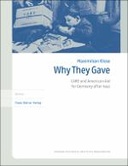Explore

What motivates people to give to those in need? How do their actions reflect the historical moment in which they occur? Founded in 1945, the Cooperative for American Remittances to Europe (CARE) allowed U.S. citizens to send humanitarian aid to friends, family, and strangers overseas. Germany was the most popular destination for CARE packages, with numbers exceeding those of all other European destinations combined. Maximilian Klose examines why Americans were more likely to give aid to their recently defeated enemies than to their allies or to the victims of Nazi aggression. Embedding a diverse selection of case studies in the social, cultural, and political debates of the early postwar era, the study finds that these acts of giving were much more than altruistic deeds. In fact, donors used humanitarianism for their own purposes. Some gave to people who reflected their own worldview and sense of importance, or who could strategically advance their power on either side of the Atlantic. Others supported causes they considered essential to the progress of German-American relations in the early Cold War. In all cases, humanitarianism was at least as much about the donor as it was about the recipient.
This book is included in DOAB.
Why read this book? Have your say.
You must be logged in to comment.
Rights Information
Are you the author or publisher of this work? If so, you can claim it as yours by registering as an Unglue.it rights holder.Downloads
This work has been downloaded 25 times via unglue.it ebook links.
- 25 - pdf (CC BY-NC-ND) at Unglue.it.
Keywords
- History
- Humanities
Editions

